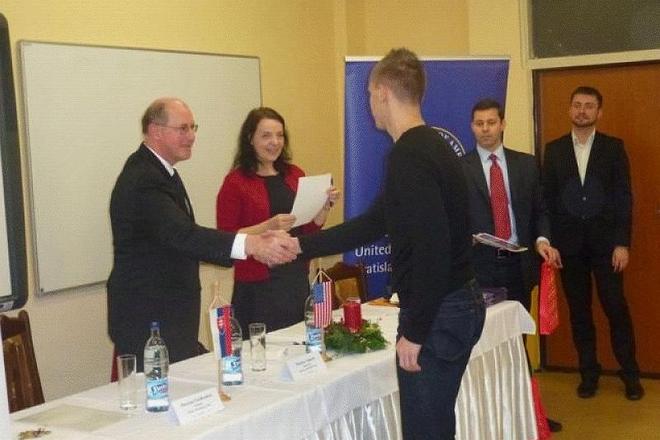“IF YOU do not steal from the state, you are depriving your own family”. This is one of the ironic slogans that people used during the communist regime to justify the day-to-day corruption that became part of many people’s daily lives. But Theodore Sedgwick, the United States Ambassador to Slovakia, told students at the Business Academy in Nitra that one needs to look at the phenomena of corruption beyond just stereotypes since it is not only post-communist countries that need to work ceaselessly to weed out corruption. He added that his homeland always has emerging corruption cases but said that in the US “when we identify corruption, we prosecute it and the people involved with it”.
One of Slovakia’s policies that Ambassador Sedgwick finds commendable and that he would readily export to the United States is the zero-alcohol tolerance for automobile drivers. He recommended that Slovakia’s zero-tolerance policy on alcohol should be applied to corruption as well.
“You can’t have a little bit of corruption,” Sedgwick stated in early December 2011. “Once you start down the road of corruption, if you have a little bit, then where do you stop? How much is enough?”
One of the ways to fight corrupt behaviour is to improve transparency in societies, Sedgwick told the students during his discussion in Nitra as part of the Bringing the World to the Classroom project developed by The Slovak Spectator, several foreign embassies in Slovakia and Sugarbooks, a distributor of textbooks.
Even though citizens may become pessimistic about fighting corruption when they learn that it is pervasive in their society, Sedgwick said that was not his feeling after reading papers the students had written, saying that since the writers “represent some of the future business leaders of this country” there is reason for optimism. Sedgwick told The Slovak Spectator that the students had absolutely “nailed the phenomena of corruption” and openly addressed its multiple forms in Slovak society. “I learned from your essays that corruption is not only about official corruption in government procurement but it’s also about day-to-day corruption in people’s lives,” Sedgwick stated.
One of the students, Veronika Strnisková, suggested in her essay that if nothing is done about corruption then it will be even more difficult to change it in the future, since children will continue inheriting some of the corrupt practices from their parents. Lea Lenická wrote that corruption arises when clear rules, clear limits to power and clear duties are lacking and she believes that stricter rules for state employees and giving decision-making to a team of professionals rather than only one person could bring improvement.
Student Adam Lauko wrote that information on the flow of money should be reported and made available to the public, while organisations and companies should create policies permitting employees to report corruption without fear of losing their jobs, adding that he thinks many people are afraid to report corrupt for this reason. Marian Súlik asked in his essay “is it [weeding out corruption] an impossible mission”? His answer was that corrupt behaviour can be diminished but it will never completely disappear because the desire for money and power is part of human nature.
Ambassador Sedgwick concluded that one of the solutions is to make sure that “corruption is discovered, that it is prosecuted and that the people who are convicted of corruption actually go to jail”.


 US Ambassador Theodore Sedgwick in Nitra. (source: Courtesy of the BusinessAcademyin Ni)
US Ambassador Theodore Sedgwick in Nitra. (source: Courtesy of the BusinessAcademyin Ni)